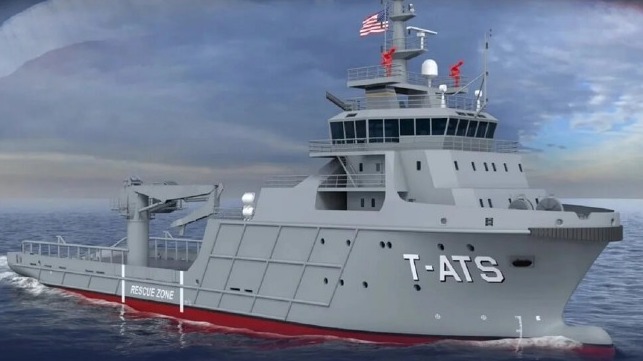Austal Cuts Profit Guidance After Losses on Underbid T-ATS Program

In 2016, Australian shipbuilder Austal admitted that it had underbid its contract to build the U.S. Navy's aluminum Independence-class Littoral Combat Ship, and it was well behind project benchmark progress. Reporting issues dating back to 2013 had delayed accounting for the problem, eventually forcing a trading halt, a sudden write-down and an unexpected full-year loss of $120 million.
This week, Austal admitted that it had underbid its contract to build the U.S. Navy's T-ATS fleet tug series on its new steel-panel assembly line. Due to "inaccurate assumptions" in the bid, the time and cost for operating the line were greater than expected. Rampant inflation exacerbated this issue, and mid-build change orders added more cost hikes. Reporting issues delayed accounting for these problems, eventually forcing a trading halt and a deep cut in EBIT projections for 2023. (Unlike the legal issues with LCS accounting in 2013-2016, no fraud has been alleged in connection with T-ATS.)
The Navy recently added onto the T-ATS program's financial loss by exercising an option to order a fifth vessel at a lower price. The contract terms set the unit price for the fifth ship at about $5 million less than the previous two.
After accounting for all of the losses across the T-ATS program, and projecting the effects forward, Austal has cut its EBIT guidance from a $40 million profit down to $0 to -$7 million for the year. This unexpected cost overage of up to $47 million has not yet been passed on to the U.S. government, but Austal has filed contract appeals to ask the Navy to help it with the extra costs - known in federal contracting as Requests for Equitable Adjustment (REAs) - and is optimistic that it will receive extra payments over the bid price.
In an echo of the LCS program, reporting was part of the problem, the firm said. “It is clear that we need to make changes to some reporting structures and processes so that Austal USA can identify and rectify these sorts of issues in a more timely manner, said Austal Ltd. CEO Paddy Gregg in a statement.
After a brief trading halt, the news of the loss caused Austal's stock price to fall to $1.54, down from $1.92 last week. Austal has previously confirmed that it is in talks to delist and go private.
Going forward, the shipbuilder noted that its more recently awarded contracts have price adjustment clauses, which put more responsibility on the Navy for paying for cost escalation and variations. Austal has also adopted lessons-learned from the early operations of its steel panel line and built more accurate cost estimates into its recent bids.
Austal also holds steel construction contracts for the $3 billion-plus U.S. Coast Guard Offshore Patrol Cutter program; the $3 billion T-AGOS surveillance ship series; the Auxiliary Floating Dock Medium; and modules for the Virginia-class attack submarine. Legacy aluminum products include the Expeditionary Fast Transport (EPF) and the Independence-class LCS series, which will phase down as the final ships are delivered. It may also play a future role in the $120 billion Australian-American-British nuclear sub program (AUKUS).
Cost overruns occur in the majority of U.S. Navy shipbuilding projects, and have since at least the Reagan administration. In a 1987 study, the Government Accountability Office found that 19 of 22 shipbuilding programs over the course of 1981-86 had cost overruns, and "most result from shipbuilders’ decisions to cut prices and to make low competitive offers to obtain Navy contracts." When these overruns put financial stress on shipbuilders, it often "resulted in large claims against the government," GAO warned. 33 years later, in 2020, GAO found that “most Navy major defense acquisition programs . . . have had cost growth, schedule delays or both since first full estimate."
